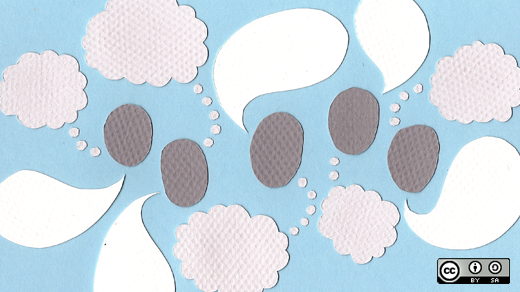As I mentioned when The Queue launched, although typically I will answer questions from readers, sometimes I'll switch that around and ask readers a question. I haven't done so since that initial column, so it's overdue. I recently asked two related questions at LinuxQuestions.org and the response was overwhelming. Let's see how the Opensource.com community answers both questions, and how those responses compare and contrast to those on LQ.
Why do you use Linux?
The first question I asked the LinuxQuestions.org community is: What are the reasons you use Linux?
Answer highlights
oldwierdal: I use Linux because it is fast, safe, and reliable. With contributors from all over the world, it has become, perhaps, the most advanced and innovative software available. And, here is the icing on the red-velvet cake; It is free!
Timothy Miller: I started using it because it was free as in beer and I was poor so couldn't afford to keep buying new Windows licenses.
ondoho: Because it's a global community effort, self-governed grassroot operating system. Because it's free in every sense. Because there's good reason to trust in it.
joham34: Stable, free, safe, runs in low specs PCs, nice support community, little to no danger for viruses.
Ook: I use Linux because it just works, something Windows never did well for me. I don't have to waste time and money getting it going and keeping it going.
rhamel: I am very concerned about the loss of privacy as a whole on the internet. I recognize that compromises have to be made between privacy and convenience. I may be fooling myself but I think Linux gives me at least the possibility of some measure of privacy.
educateme: I use Linux because of the open-minded, learning-hungry, passionately helpful community. And, it's free.
colinetsegers: Why I use Linux? There's not only one reason. In short I would say:
- The philosophy of free shared knowledge.
- Feeling safe while surfing the web.
- Lots of free and useful software.
bamunds: Because I love freedom.
cecilskinner1989: I use linux for two reasons: stability and privacy.
Why do you use open source software?
The second questions is, more broadly: What are the reasons you use open source software? You'll notice that, although there is a fair amount of overlap here, the general tone is different, with some sentiments receiving more emphasis, and others less.
Answer highlights
robert leleu: Warm and cooperative atmosphere is the main reason of my addiction to open source.
cjturner: Open Source is an answer to the Pareto Principle as applied to Applications; OOTB, a software package ends up meeting 80% of your requirements, and you have to get the other 20% done. Open Source gives you a mechanism and a community to share this burden, putting your own effort (if you have the skills) or money into your high-priority requirements.
Timothy Miller: I like the knowledge that I can examine the source code to verify that the software is secure if I so choose.
teckk: There are no burdensome licensing requirements or DRM and it's available to everyone.
rokytnji: Beer money. Motorcycle parts. Grandkids birthday presents.
timl: Privacy is impossible without free software
hazel: I like the philosophy of free software, but I wouldn't use it just for philosophical reasons if Linux was a bad OS. I use Linux because I love Linux, and because you can get it for free as in free beer. The fact that it's also free as in free speech is a bonus, because it makes me feel good about using it. But if I find that a piece of hardware on my machine needs proprietary firmware, I'll use proprietary firmware.
lm8: I use open source software because I don't have to worry about it going obsolete when a company goes out of business or decides to stop supporting it. I can continue to update and maintain the software myself. I can also customize it if the software does almost everything I want, but it would be nice to have a few more features. I also like open source because I can share my favorite programs with friend and coworkers.
donguitar: Because it empowers me and enables me to empower others.
Your turn
So, what are the reasons you use Linux? What are the reasons you use open source software? Let us know in the comments.
Fill The Queue
Lastly, what questions would you like to see answered in a future article? From questions on building and maintaining communities, to what you'd like to know about contributing to an open source project, to questions more technical in nature—submit your Linux and open source questions.







16 Comments